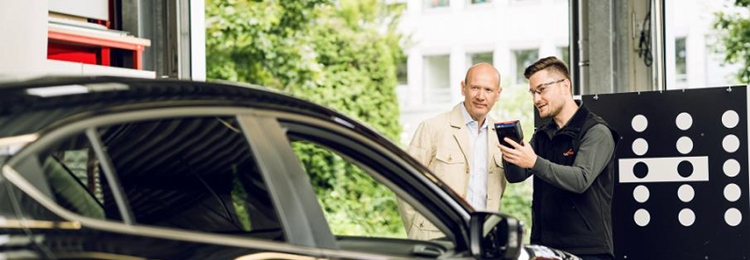
ATU and Carglass® test case against Fiat Chrysler challenges vehicle manufacturers’ obstructions – Court refers the case to the European Court of Justice
Date: Monday 25 July 2022
Almost any activity of a car repair shop (whether repair or maintenance) requires that the mechanic gets access to the car data stream via the so-called onboard diagnostics (OBD) port. ATU, like any other independent repair shop, gets this access using common multi-brand diagnostic devices connected to the OBD port of the car.
Similarly, the replacement of a windscreen is a technically complex process in a modern vehicle. Already today, ca. 30% of all vehicles need a calibration of its driver assistance system when the windscreen has been replaced – a number that keeps rising. The specialists at Carglass® also directly access the vehicle data stream via the OBD port for this calibration.
However, some vehicle manufacturers have begun to increasingly obstruct access to the OBD port by independent repair shops, for example by demanding the prior personal registration of the fitter, the payment of license fees for the opening of the port, and/or an internet connection to their servers during the diagnostic process.
With these technical hurdles, vehicle manufacturers are affecting free competition in the aftermarket and the consumers’ freedom of choice. This may lead to higher prices for the consumers – be it in repair shops or in form of increased insurance premiums. Independent undertakings like ATU and Carglass® depend on such vehicle manufacturers, who must activate their access to the vehicle data stream. Both companies believe that allowing vehicle manufacturers to make post-sale diagnosis contingent on the fulfilment of such conditions is incompatible with European law.
ATU and Carglass® decided to have the issue resolved by the Regional Court of Cologne in a test case against Fiat Chrysler (FCA Italy SpA – “FCA“). As the case involves an interpretation of an EU Regulation, namely Regulation (EU) 2018/858, the claimants requested the national first instance court to refer the case to the European Court of Justice (ECJ) for an interpretation of the provisions in question.
Now, the Regional Court of Cologne has decided to refer the case to the ECJ. The ECJ case number is C-296/22. Specifically, the question to be decided by the ECJ is whether the conditions imposed by FCA for the activation of the OBD port (the so-called “Secure Gateway”: personal registration of the mechanic with FCA, continuous internet connection to the FCA server during writing processes) are admissible under EU law.
Both ATU and Carglass® greatly welcome this step taken by the Regional Court of Cologne. The interpretation of EU law will provide legal certainty throughout the EU by the ECJ and will be binding for both the vehicle manufacturers and all independent market players – beyond ATU and Carglass®. Both companies are represented by international legal practice Osborne Clarke.
